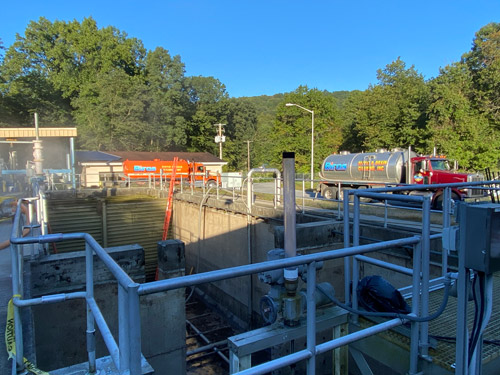Wastewater is a natural byproduct of many of the conveniences we enjoy. From water draining from your shower to runoff from the roads, everyone in some way contributes to creating wastewater. But what do we do with all of it?
The answer to that depends on whether you are getting rid of residential, commercial, or industrial wastewater. Some of it gets filtered by soil, and others get transported by a wastewater hauling contractor to a treatment plant. Here at Biros Septic & Drain Cleaning, we are experts in safe, cost-effective transportation to dispose of wastewater properly. Just schedule an appointment to get started!
What Exactly Is Wastewater?
Simply put, wastewater is liquid waste. It comes from flushing your toilet, taking a shower, washing dishes, or doing laundry in a residential setting. Commercially, it’s a byproduct from food and beverage manufacturing, oil and gas mining, or other industrial processes. Any used water that cannot be consumed or used again is considered wastewater.
Wastewater is mostly water, with a small number of other contaminants like human feces, nitrogen, phosphorus, food, soaps, and detergents. Wastewater needs to be transported to wastewater treatment plants, either through the sewer system or a wastewater hauling contractor, to remove the contaminants and release treated water back into a local body of water.
Getting Rid of Residential Wastewater
For residential users with sewers, getting rid of wastewater is as simple as flushing the toilet or draining the water from a bath. The wastewater flows into the sewer system and eventually to a treatment facility.
Suppose you are on a well and septic instead. In that case, the waste flows into the septic tank, where the solid waste settles to the bottom, and scum floats on top. The wastewater leaves the septic tank and percolates into the soil, which filters the contaminants.
You have an essential job to ensure your septic tank is regularly serviced and inspected to prevent high levels of nitrogen and phosphorous from entering the groundwater. You also want to be sure not to flush certain items, like food, chemicals, and cooking grease.
Also, be aware of these five situations that require emergency septic pumping.
Disposing of Industrial Wastewater
Much like residential wastewater, you need to correctly dispose of industrial wastewater. The Clean Water Act requires industries, such as mining and gas drilling operations, among others, to follow the established guidelines of the National Pollutant Discharge Elimination System (NPDES) program.
This NPDES requires wastewaters from industrial applications to be removed either through sewer systems connected directly to a water treatment facility or through a wastewater hauling contractor, like Biros Septic, to transport the waste. This cost-effective and safe option will come to you with a vacuum tanker truck to clean, remove, and dispose of wastewater with high vacuum equipment. You won’t need to worry about transporting the wastewater independently, which can be costly and dangerous to an untrained person.
Removing Commercial Wastewater
Beauty salons, car washes, or grocery stores are some businesses that create wastewater. This commercial wastewater follows similar guidelines to residential sewage. If the retail space is connected to a sewer, water will be transported to a treatment facility to remove contaminants. For commercial locations on well and septic, the septic tank will treat the wastewater so long as it’s appropriately maintained.
Commercial septic tanks require professional servicing with advanced certified experience and knowledge beyond what is required to service residential customers. Luckily, Biros Septic is well versed in all septic needs, including those in commercial spaces.
If your business needs grease trap pumping, bulk liquid sludge hauling, sewer line opening, car wash pit cleaning, or other septic services, schedule an appointment with Biros today!
Treatment Plant Settling Tanks
When the water reaches a treatment plant, it goes through various processes to remove the contaminants. Eventually, those contaminants build up in the settling tanks, creating a layer of sludge at the bottom of the tank. These tanks, along with digesters, sand filters, and grit chambers, must occasionally be cleaned of the sludge.
A wastewater trucking company compliant with all current regulations, like Biros, should properly clean and dispose of the waste in those tanks. With state-of-the-art, high-vacuum equipment, larger tanker trucks, and certified crews, Biros is your first choice to transport this waste to an approved PA Department of Environmental Protection disposal facility.
Need a Wastewater Hauling Company? Call Biros!
Whether you need to treat residential, commercial, or industrial wastewater, Biros Septic and Drain Cleaning is your local, trusted wastewater hauling company! Our trained and certified techs can come to your home or place of business in Scranton, Wilkes-Barre, and surrounding areas to transport your wastewater for you. Schedule an appointment today to get started!

